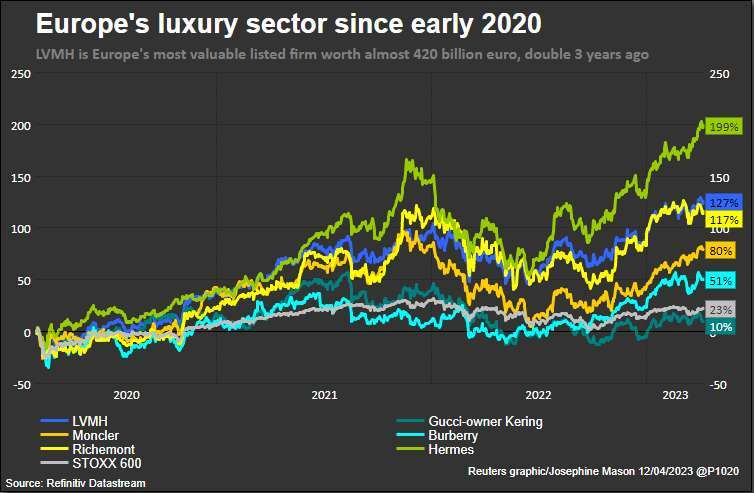
By Mimosa Spencer
PARIS (Reuters) – Luxury shoppers in the United States are curtailing purchases of high-end fashion and leather goods, LVMH’s first-quarter sales report showed, adding to evidence that a strong, months-long, post-pandemic splurge may be ending.
Shares in Europe’s most valuable listed company rose nearly 5% to record highs in early trade on Thursday after it reported a 17% jump in sales, thanks to a sharp rebound in China following the end of COVID-19 lockdowns. [.EU]
U.S. revenue grew 8% over the quarter but the French group’s finance chief Jean-Jacques Guiony said most of that was down to brisk business at its less exclusive Sephora beauty chain.
“For the rest, the business is slowing down a bit,” he said, citing softer demand for fashion and leather goods – where sales to U.S. shoppers both at home and abroad were “flattish” – as well as jewellery.
“Maybe interest rate rises are taking their toll on spending,” Guiony said.
European labels including LVMH’s Louis Vuitton and Dior, as well as Chanel and Hermes have been riding a wave of strong demand from Americans, who emerged from lockdowns with savings and a desire to splash out on designer labels.
LVMH’s U.S. sales grew 15% last year, and the U.S. market accounted for 27% of overall revenue, as shoppers shrugged off rising prices and turbulent markets.
High demand prompted a flurry of investments, with brands including rivals Hermes and Kering-owned Gucci opening new retail spaces in sprawling malls like American Dream in New Jersey and South Coast Plaza shopping centre in California, and in cities like Austin, Texas.
But the spending spree from shoppers is beginning to show signs of slowing.
Credit card data from Citi released this week showed that U.S. luxury spending in March declined to the lowest monthly rate in nearly three years, down 18% as fewer people splashed out on high-end goods.
Younger shoppers, who drew on savings during lockdowns are now under more pressure from rising prices than older generations with higher incomes, Citi analysts said.
LVMH shares have doubled in 3 years, https://fingfx.thomsonreuters.com/gfx/mkt/egpbyljmevq/lvmh.PNG

BIGGEST BEAR STORY
The United States is “the biggest bear story” in the luxury sector, HSBC said in a recent note, though it cautioned fears of a sharp downturn may be exaggerated.
“(The) softer U.S. consumer is an important caution point,” said Oliver Chen, an analyst with Cowen, flagging possible risks for Tapestry and Versace owner Capri due to their exposure to the handbags segment.
LVMH saw a particular slowdown in U.S. demand for its Hennessy cognac, as a steep price increase, meant to offset rising energy and glass costs, were “probably a bit difficult to absorb by some clients”, Guiony said.
He added the group is taking a cautious approach to price increases this year — not just for cognac.
LVMH will also soon show off a hefty investment in U.S. jewellery group Tiffany, which it bought for $16 billion in 2021, with the reopening of the New York flagship store after three years of renovation.
The store, which accounted for around 10% of Tiffany sales before closing for the refurbishment, is likely to reopen near the end of the month.
“It’s probably the most emblematic luxury store in the world,” said Guiony.
He said that developing Tiffany’s sales through product innovation and expanding and renovating stores would be a priority, while margin expansion would likely kick in at a later stage, in a strategy similar to that it applied to Bulgari.
Elliott Savage, portfolio manager of U.S.-based fund YCG Investments, which holds shares in LVMH and other luxury brands, said a weakening U.S. luxury market in the near term could present an opportunity for dominant players to take market share.
“It could actually end up being better (for LVMH) in terms of strengthening their position,” Savage told Reuters.
LVMH’s luxury divisions, which span fashion, leather goods, watches and jewellery, have been gaining on rivals in recent years, almost doubling their global market share to 22% from 12% between 2018-2023, according to Jefferies.
Many high-end labels are still moving further upmarket and rolling out new services for their wealthiest clients, seen as more resilient to economic headwinds.
Gucci this week opened a salon catering to high-end clients in Melrose Place in Los Angeles where red carpet-ready evening wear is displayed on mirrored pedestals. The group plans to open nine more similar boutiques including in New York and Shanghai.
(Reporting by Mimosa Spencer and Silvia Aloisi; Editing by Emelia Sithole-Matarise)


